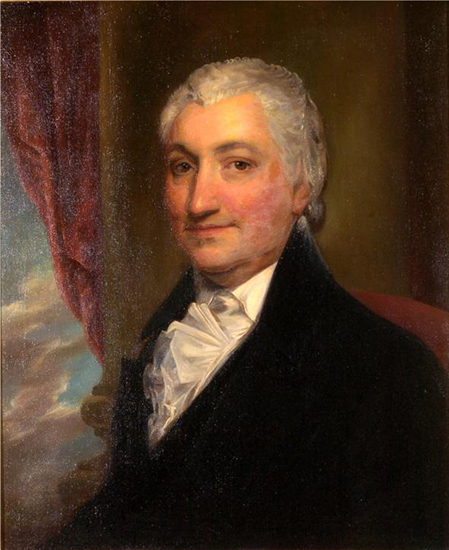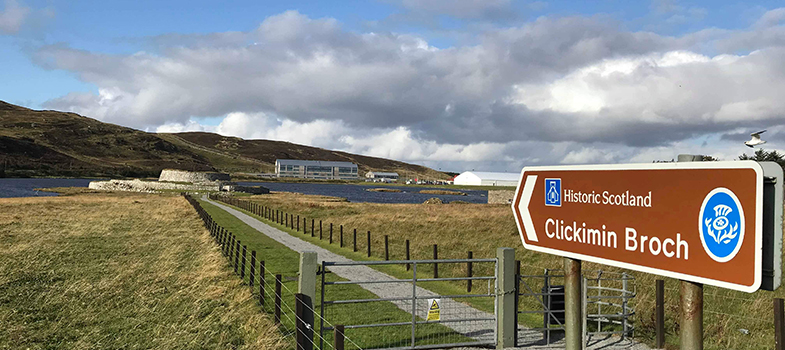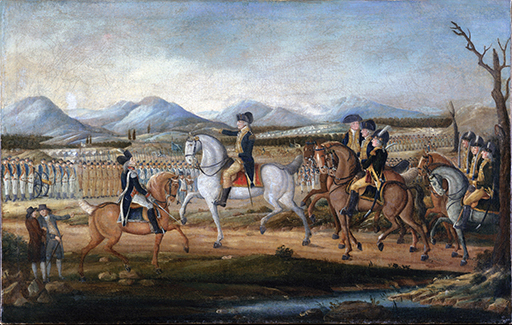16.4 Scots in North America
You are now going to take a closer look at Scots emigrating to North America. The Scots and Ulster Scots migrations [Tip: hold Ctrl and click a link to open it in a new tab. (Hide tip)] to that continent left a distinctive linguistic legacy, particularly in the Southern States where words and expressions like poke (bag), redd up (clear up), galluses (braces), and no a haet (not a thing) survive in the local speech. Add to that the popularity of Burns and Scott and a literary tradition with a Scots voice.
Activity 8
In this activity you will engage with a poetic flyting – or verbal duel – in Scots, between Ulster-born David Bruce and the other protagonist was Hugh Henry Brackenridge who left Campbeltown at the age of five, but was also brought up in the Ulster Scots colonies of western Pennsylvania. Both used naturally the language of their American community.
They also knew the shared tradition in which they were working. The poetic flyting took place on the Pennsylvania frontier at the time of the Whiskey Rebellion, a tax protest during the time of George Washington’s presidency, from 1791 to 1794.
Part 1
Listen to Bruce’s verse on the drink at the centre of local politics in 1794 and try to understand the spoken Scots. Then, record yourself reading the verse using the transcripts.
Note that the only phrase you might not find in the DSL or any other dictionary is one bee, but you will find ane body, which carries the same meaning – anyone/anybody.
Transcript
Listen
Great Pow'r, that warms the heart an liver,
And puts the bluid aw in a fever,
If dull and heartless I am ever,
A blast o thee
Maks me as blyth, and brisk, and clever
As ony bee.
Model
Great Pow'r, that warms the heart an liver,
And puts the bluid aw in a fever,
If dull and heartless I am ever,
A blast o thee
Maks me as blyth, and brisk, and clever
As ony bee.

Brackenridge, the founder of the University of Pennsylvania, as well as a lawyer and a novelist, used Scots not solely for poetry. In his chief work Modern Chivalry he introduces a Scots-speaking character with strong religious conviction called Duncan Ferguson. In an article on the two poets in American Speech in 1928, Claude M. Newlin, writes: ‘Since Bruce was an ardent Federalist, he no doubt considered Scots to be the most effective medium in which he could appeal to his frontier audience’ (1928, p. 107).
Brackenridge's son, Henry Marie Brackenridge also conveyed his native dialect in his writing, having learned a rich spoken Scots from his grandmother: ‘I learned the Scottish dialect from her, and read to her The Gentle Shepherd and other poems of Ramsay and Fergusson [...] My father had a curious collection of the Scottish poets, from James author of the King's Quair, and Gavin Douglas, down to Burns’ (Newlin, 1928, pp. 107–8).
And Newlin also cites Brackenridge in order to convey why he considered it appropriate to write in Scots when he writes: ‘The dialect […] which is called braid Scots, or what is the same thing, the Scots-Irish, was my native dialect’ (1928, p. 108).
Also, in Appalachia there remained a saying for bairns that wis feart, “Wheesht ye, wheesht ye, dinnae fret ye…Claverhoose he wullnae get ye.” The bogeyman among Ulster and Ayrshire covenanters being John Graham, Earl of Claverhouse, for his depredations against the “guid an godly” during the Kullin Times.
In the Cape Fear district bordering North and South Carolina in the baking flatlands of Scotland County, I also discovered that as recently as 1907 a book entitled Lyrics from Cottonland by John Charles McNeill was published. Descended from Kintyre folk, McNeill's poetry reflects the voices of the black, Indigenous and white people of the area. He is regarded as the poet laureate of North Carolina. In the poem ‘On the Cape Fear’ he condenses the history of the Argyll colony in a Scots voice which rings true even today.
Prince Charlie an I, we war chased owre the sea
Wi naething but conscience for glory.
An here I drew sawrd, when the land wad be free,
An was whipped tae a hole as a Tory.
When the Bonny Blue Flag was flung tae the breeze,
I girded mysel tae defend it:
They warstled me doun tae my hands an my knees
An flogged my auld backbane tae bend it.
Sae the deil wan the fights, an wrang hauds the ground,
But God an mysel winna bide it.
I hae strenth in my airm yet for many a round
An purpose in plenty tae guide it.
I been banished an whipped an warstled an flogged
(I belang tae the Democrat party)
But in gaein owre quagmires I haena been bogged
An am still on my legs, hale an hearty.
To find out more about the poet and the poem and read a translation into modern English of the poem on the All Poetry website.
Activity 9
Part 1
You will listen to a story of what I heard over in the USA about a patient and a nurse and the Scots language. Pay particular attention note to sequence of events and the outcome of the story.
Transcript
Noo, gien talks on Scots ower the years, I’ve hained stories I’ve been tellt bi fowk anent the mither tongue. A guid ane cam bi wey o a wumman that haed been a nurse an wrocht in ane o the muckle hospitals in Chicawgie. There they had a lang leit o aw the leids spoken in the hospital, reflectin the braidth o the ethnic communities in siclike cities. Onywey, an auld bodie wes brocht in that wes gey waunert haein been cowpit in an accident wi a caur. Naebody cuid unnerstaun or communicate wi the wumman, although they pried pree’d wi German, Norwegian an Dutch speakers. The Scottish nurse happened tae be passin the auld bodie, when she recognised whit she wes saying….”oh it’s gey sair, it’s gey sair – I cannae thole it ony mair, can ye no gie me ocht for it, hen – this stound’s garrin me grue. Can ye no speir at thaim hen, tae gie me somethin…” “Weel” said the nurse, “gin ye can tell me whaur the stound is waur, we’ll get ye sortit oot gey suin I’m shuir.” The wumman made a full recovery and thon Chicawgie hospital is ane o the few places in the warld whaur Scots haes been eikit tae the leit o offeicial leids! We’re jist waitin for ither places tae catch up.
Part 2
Now reconstruct the sequence of events by putting the items below in the correct order.
Two lists follow, match one item from the first with one item from the second. Each item can only be matched once. There are 9 items in each list.
-
A nurse who used to work in one of the major Chicago hospitals told this story.
-
Patients there came from diverse ethnic communities speaking many languages.
-
One day, an old woman was admitted who was hurt badly in a car crash.
-
Nobody could communicate with her despite trying different languages.
-
A Scottish nurse happened to walk past when she recognised the language.
-
The patient exclaimed: I can’t stand the pain anymore, can you give me anything for it?
-
The nurse replied: If you show me where the pain is worst, we can help you soon.
-
The old woman made a full recovery.
-
That Chicago hospital now lists Scots as one of its official languages.
Match each of the previous list items with an item from the following list:
a.4.
b.1.
c.5.
d.2.
e.3.
f.6.
g.8.
h.7.
i.9.
- 1 = b,
- 2 = d,
- 3 = e,
- 4 = a,
- 5 = c,
- 6 = f,
- 7 = h,
- 8 = g,
- 9 = i
Another public display of Scots seen across the United States and Canada are golf courses which have names on them that are copies of the ones at home in Scotland – lang whangs and Swilken burns abound. One pioneer golf professional told me he never compromised his good Scots tongue when teaching, so his pupils learned Scots expressions like “ca cannie” an “gie it a guid skelp”.
At the funeral oration to Fred Brand Jr, winner of the Bob Jones award for his contribution to American golf, the main toast was Fred’s own favourite, “Lang may yer lum reik”.
16.3 Scots in Mainland Europe

